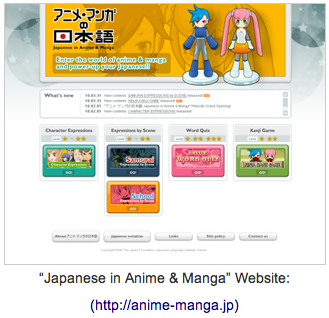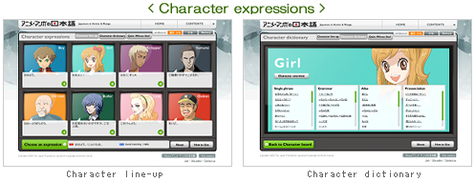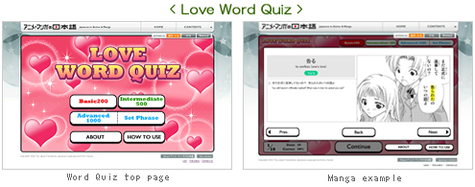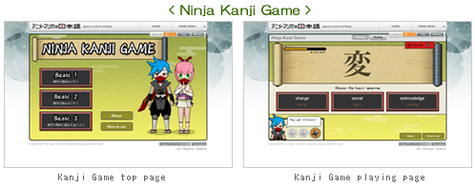Activity Reports:Japanese-Language Education Overseas:Website "Japanese in Anime & Manga" Opened!
Nanae Kumano,
Japanese-language specialist at the
Japanese-Language Institute, Kansai
Today, Japanese anime and manga are winning high favor with young people around the world and are motivating many to start learning Japanese. Many of the words and phrases in these media are, however, not found in Japanese textbooks or dictionaries, because the characters and genres found in anime and manga are too broad to be completely covered. This makes it even more difficult for foreigners to understand the contents in Japanese. For these Japanese learners who love anime and manga, the Japan Foundation, Japanese-Language Institute, Kansai has launched an e-learning site "Japanese in Anime & Manga" to offer a fun way to learn a number of character / genre-based Japanese expressions that appear in anime and manga, as well as underlying Japanese culture.
Site features
(1) This website was created with lines actually used by characters in anime and manga works popular overseas as a basis. Users can learn a casual style of Japanese not found in the usual textbooks and dictionaries.
(2) With anime-style characters and manga-style explanations, users can learn through a perspective unique to anime / manga.
(3) Users can learn in a fun way through quizzes and games, choosing their own preferred study contents and method, according to their own level and interests.
In order to cater for a range of ability levels, from beginners to advanced learners, this website offers three options for Japanese notation (a mix of kana and kanji, kana only, and Roman characters) and two options for explanation (English and Japanese).
Contents
(1) Character expressions
With eight typical characters in anime and manga (Boy, Girl, Scrapper, Samurai, Old man, Butler, Lady, and Osakan), users can learn distinctive expressions unique to each character. This content includes three sections, or Zones: "Character Line-up Zone", where the difference in expressions between characters is clear at a glance; "Character Dictionary Zone", where a character's individual style of speech (Single phrases, Grammar, Alias, and Pronunciation) is explained with sample sentences and illustrations; and "Quiz: Whose Line? Zone", where users can review what they have learned in a fun way. Each sample sentence is available with audio playback by voice actors / actresses.
(2) Genre expressions
Users can study expressions typical of 4 genres (love and romance, school, ninja, samurai) of anime / manga.
Expressions by Scene
Using a manga that depicts a storyline typical of the genre, learners can study single phrases, onomatopoeia (Sound FX) and cultural information common in various manga scenes. There is also a manga Sound FX quiz that can be played via drag-and-drop.
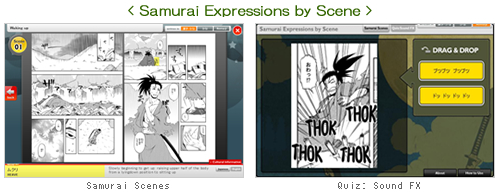
Word Quiz
Learners can study using quizzes where words used in each genre are categorized by level: Basic 200, Intermediate 500, and Advanced 1000. The advanced level also includes Set Phrases such as "Yakimochi o yaku (to be jealous)". Manga examples using each word are also available.
Kanji game
Users can learn the meaning or reading of kanji often found in a particular genre through a thrilling time-limited game with two levels: Novice (beginner) and Expert (upper-intermediate). When users score a pass mark in the game, they can get prize items.
Since its grand opening on February 1, 2010, this website has been referred to on many overseas websites and blogs of manga/anime fans, which has no doubt contributed to over 500,000 page views from 128 countries within two months. Japanese-language learners who love anime and manga gave us plenty of favorable feedback, such as "This website really understands what fans of anime and manga really want!" and "Great! I'm looking forward to seeing new contents." These voices from the users encourage us to continue enhancing the website with more and more new contents in the hope that it will help people who have just a smattering of Japanese to step forward and try their best to learn the language all out.
Related Articles
Back Issues
- 2025.9.30 The 51st Japan Found…
- 2025.9.30 The Japan Foundation…
- 2025.9.30 Bringing the World C…
- 2025.9.30 The 51st (2024) Japa…
- 2025.9.30 Japan Foundation Pri…
- 2024.5.24 The 50th Japan Found…
- 2024.3. 4 Movie Theaters aroun…
- 2023.4.10 The 49th Japan Found…
- 2023.3.28 JF's Initiatives for…
- 2023.1.27 Living Together with…


